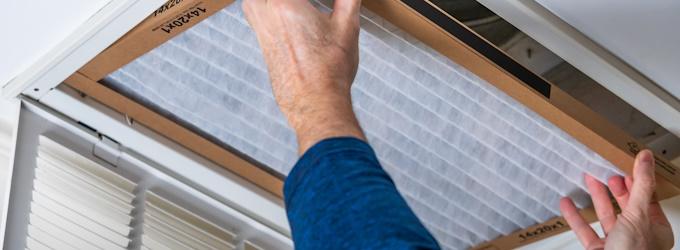Your Friendly HVAC Air Filter Maintenance Guide
An HVAC air filter can protect homeowners by cleaning dust and other particles out of the air and improving air quality. Filters also protect your HVAC system from all the particulates in the air that could damage its parts, extending the life of your system.
Keep reading to get answers to the most common questions about HVAC air filters.
What Are HVAC Air Filters Made Of?
The air filters used in your home’s heating and cooling systems are generally made with spun fiberglass or pleated paper that catches dust and other particulate matter, like pet dander. Reusable filters are also available.
Why Do I Need a Filter?
Many people are adversely affected by poor indoor air quality, suffering from allergies, asthma, and other respiratory illnesses. Proper HVAC filter maintenance allows you to keep your household healthy, and learning how to clean a furnace filter is an important part of this.
Related Reading: Not all HVAC air filters are created equally.
What Is an Air Filter MERV Rating?
Every HVAC air filter has a Minimum Efficiency Reporting Value (MERV). MERV measures how effectively the filter can remove particles from the air, such as emissions, pollen, and pet dander, while maintaining air flow. The MERV scale ranges from 1 to 20, with 1 being the least effective and 20 being able to filter out even the smallest particles.
But if you immediately think, “I need a filter with a MERV rating of 20,” think again. Filters rated at 20 are so dense that regular home HVAC systems would be forced to use a lot of energy to push the air through, if they could at all.
Disposable HVAC air filters for residences generally range between MERV 4 and 13, and can be very effective. Filters with a MERV rating of 11 to 13 can remove fungal spores and even bacteria from the air in your home. Talk to your local HVAC professional to learn which MERV-rated filter is best for your system.
What Is a Washable HVAC Air Filter?
Some furnace filters are actually washable and reusable. These are electrostatic filters, which can be up to 10 times more efficient than disposable filters.
Electrostatic filters trap particulate matter using static electricity. In winter, if you’ve had your clothes stick to you, or brushed your hair and watched as strands stood on end, that’s static cling! Electrostatic filters use that same static electricity to trap the dust and allergens that pass through the filter.
These are completely interchangeable with regular filters. Check your HVAC air filter specs to purchase the right size and ask your HVAC professional whether an electrostatic filter is right for your home.
Washable air filters should be cleaned every month, and more often if you have pets or are surrounded by smog. They cost more up front than disposable filters, but they can last for about five years, so that’s a win! Many electrostatic filters have a MERV rating of 8.
How to Clean a Furnace Filter
The process of swapping a filter is so simple that even the least handy homeowner can accomplish HVAC filter maintenance.
First, shut off the furnace. If you’re dealing with a disposable filter, remove it, throw it out, and put in a new one, ensuring the arrow on the cardboard frame of the filter faces the direction of the airflow.
In order to clean a reusable furnace filter, you first remove it from the furnace. Lay it on a solid surface, dirty side up, and carefully vacuum off the surface dust. Then rinse with clear water. Don’t use soap on the filter! Soap could destroy its electrostatic capabilities.
Be sure the reusable filter is completely dried out before you reinstall it. A damp filter put into the HVAC, even with air being pulled through it, could potentially grow mold and mildew – which could be blown through the house.
Check your reusable filter for wear and tear before you replace it, making sure it doesn’t have grime, tears, or holes in it. Order a new one from your HVAC technician when it starts looking bedraggled. Once the filter is in place, turn the furnace back on.
Can I Spray Fragrances on My HVAC Air Filter?
You might have considered spraying a fragrance on your filter so your furnace wafts the sweet smell through your house. Avoid this. Some scents contain alcohol, which could cause a flash fire from the fan motor.
Less spectacularly, perfumes and air fresheners contain chemicals that could corrode delicate furnace parts over time. Also, spraying a filter with any liquid will decrease the air filter’s performance.
Instead, use a patch scent that can be safely attached to the air filter. These smell great and last a long time.
How Often Should I Perform HVAC Filter Maintenance?
A dirty filter can get so clogged up that the furnace has to work even harder to push the air through, which lowers energy efficiency and raises your utility bill.
Performing HVAC filter maintenance is important to the life of your heating and cooling system, and even more important if you have allergies or asthma.
Change your filter every month if you have children or pets. Some households can change filters every 60 to 90 days.
Can I Get Help with HVAC Filter Installation Near Me?
If you need more assistance, then contact a helpful HVAC technician! An experienced and professional technician can visit your residence, replace your filter, and and perform a checkup on your heater to make sure it’s running smoothly and everything is ready to go when winter comes sweeping in.


